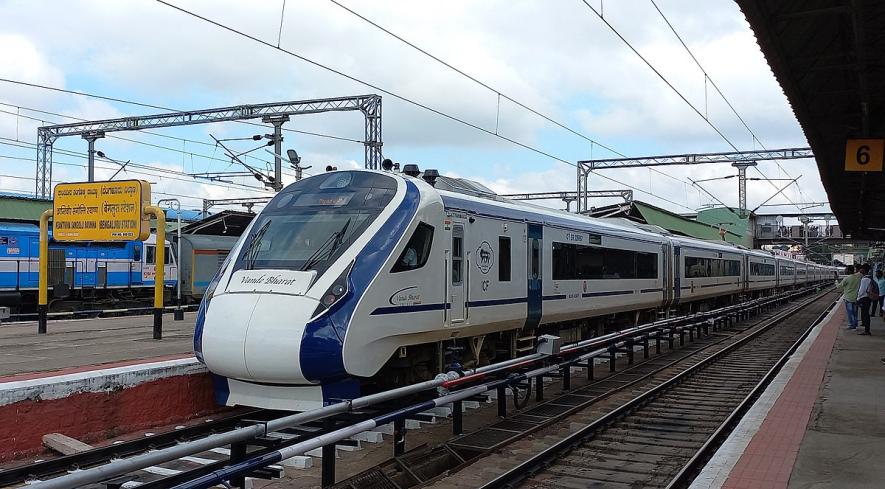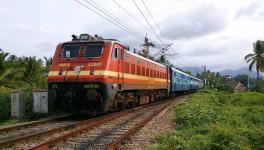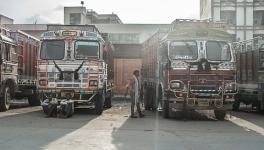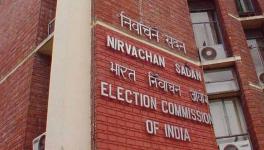No Logic in Privatising the Production of Vande Bharat Sleeper Train, say Trade Unions

Image courtesy: Wikimedia Commons
The Indian Railways signed pacts with two multinational companies to manufacture 200 Vande Bharat sleeper express trains. When Vande Bharat is designed and already produced by PSUs at a much lower cost, what is the need to privatise it? This was asked by the Joint Action Council (JAC) of trade unions at the Integral Coach Factory (ICF) in Chennai.
The private firms will be given the existing prototype, design and drawings of the sleeper trains designed by the ICF. The private companies will be provided space for production in the PSUs along with the existing infrastructure. They will also be given resources such as electricity, gas and water.
Yet the cost of production per coach is more, showing a high rate of profit to the privates alleged ICF-JAC while condemning such brazen misuse of taxpayers' money.
The Indian Railways also privatised the maintenance work for these trains for the next 35 years. The JAC estimates a total loss of 65,510 government employment.
'PRIVATE TIE-UP NOT ACCEPTABLE'
An Italian tie-up company, Titagarh Rail Systems Ltd (TRSL), and state-owned Bharat Heavy Electricals Ltd (BHEL) inked a contract with the Indian Railways to manufacture 80 Vande Bharat sleeper trains in ICF in Chennai. Similarly, a joint venture between the public sector company Rail Vikas Nigam Ltd (RVNL) and Russian engineering company Transmashholding (TMH) will manufacture 120 trains in the Marathwada Rail Coach Factory (MRCF) in Latur.
The TRSL-BHEL will produce L1 trains at Rs 139 crore/16-coach train and the TMH-RVNL at Rs 120 crore/train. In total, 3,200 coaches will be produced.
The Vande Bharat coaches were designed by the ICF and certified by the Research Designs & Standards Organisation (RDSO) under the Ministry of Railways. The train set has already been tested successfully for 180 kmph speed.
"In the international market, its production cost was Rs 200 crore, but ICF efficiently produced it at Rs 98 crore," ICF-United Workers Union (UWU) leader Rajaraman told NewsClick.
"With increased efficiency, ICF has further reduced the cost of production to Rs 70 crore, but the government is giving it away to private players at an added cost of Rs 50 crore," he said. ICF-JAC estimated an additional cost of Rs 10,000 crore for the 80 trains to be built in the Perambur factory in Chennai.
"The present prototype of the Vande Bharat train is 85% indigenous. The rest 15%, for high-speed motors, brake control and a few others, are imported. Through more research, workshop and infrastructure facilities, we can indigenise these also, and further reduce the cost of production," he said.
"When the ICF and ICF employees are ready and capable to design new versions and to adopt and manufacture the new technology, allowing other organisations to function independently within the premises of ICF is not at all acceptable," read a statement by ICF-JAC.
ICF WORKERS PROTEST
The ICF-JAC held two rounds of protests last week. It demanded the Indian Railways to withdraw the pact signed with Titagarh. The JAC pointed out that this move is against social justice because it usurps the opportunity of dignified employment for thousands of workers.
They pointed out ICF already has "22.2% vacancy in technician category, but neither ICF nor the railway board is making efforts to fill vacancies. Similarly, there are 600 vacancies in the Helper category."
To produce a 16-car rake of Vande Bharat, ICF needs approximately 227 Group-C employees – 182 direct technicians, 27 supporting staff and 18 technical supervisors.
ICF workers observed a black day on October 25, condemning the indirect privatisation of ICF.
On October 27, more than 100 workers held a sit-in protest at the ICF general manager's office from 8 am to 1 pm.
ICF is a production unit established in 1995. It has exported train coaches to developing companies and produced profit-making coaches for domestic purposes. It is the largest coach manufacturer in the world, with a record of 70,000 coaches in 68 years.
"Irrespective of political affiliations, all trade unions have joined hands in opposing private players in Vande Bharat sleeper train production, including the RSS-affiliated Bharatiya Mazdoor Sangh (BMS)," said Rajaraman.
The Vande Bharat Sleeper Express would have one first-class, four second-class and 11 three-tier coaches. It will have a total carrying capacity of 830 persons.
Get the latest reports & analysis with people's perspective on Protests, movements & deep analytical videos, discussions of the current affairs in your Telegram app. Subscribe to NewsClick's Telegram channel & get Real-Time updates on stories, as they get published on our website.
























